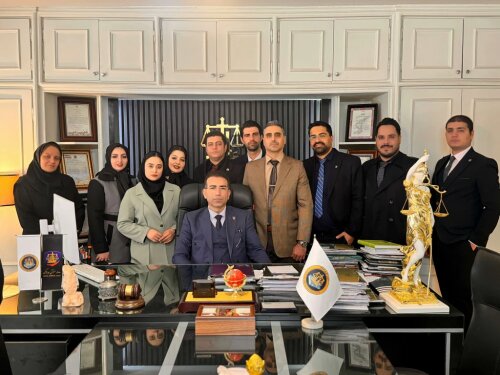Best Divorce & Separation Lawyers in Mashhad
Share your needs with us, get contacted by law firms.
Free. Takes 2 min.
Free Guide to Hiring a Family Lawyer
List of the best lawyers in Mashhad, Iran
About Divorce & Separation Law in Mashhad, Iran
Divorce and separation law in Mashhad, Iran, is governed by Islamic law as interpreted under the Iranian legal system. The process, rights, and obligations for both parties are determined by a combination of the Iranian Civil Code, Family Protection Law, and Sharia principles. Since marriage contracts, child custody, alimony, and property division are interpreted through these unique legal and religious frameworks, it is important for anyone considering divorce or separation in Mashhad to understand the local customs, proceedings, and requirements.
Why You May Need a Lawyer
Navigating divorce and separation in Mashhad can be challenging, particularly for those unfamiliar with Iranian family law. Some common situations where legal assistance is valuable include:
- Drafting or reviewing divorce petitions and agreements to ensure legal validity
- Negotiating child custody, visitation rights, and child support
- Determining the division of marital property and financial assets
- Handling alimony (nafaqah) claims or disputes between spouses
- Representing a client in court proceedings, especially if the separation is contested
- Responding to claims of abuse, mistreatment, or domestic violence
- Assisting foreign nationals or mixed-nationality couples with divorce proceedings
- Ensuring enforcement of court orders, such as those related to custody or financial support
A qualified divorce lawyer can provide guidance, protect your legal rights, and help facilitate a smoother resolution.
Local Laws Overview
Mashhad, as part of Iran, follows national legislation concerning divorce and separation, while local family courts manage the administration of cases. Key aspects include:
- There are two primary types of divorce: Talaq (initiated by the husband) and Khula (initiated by the wife, requiring court approval and usually return of dowry).
- Divorce must be sanctioned by the court, which confirms reconciliation attempts and the justification for separation.
- Child custody usually goes to the mother until a certain age (commonly 7 years for boys and girls), after which custody decisions may be revisited by the court.
- Division of property is not automatic; it depends on documentation, marriage contracts, and court rulings.
- Alimony and child support are determined based on financial capability and local living standards.
- Couples must attend family counseling sessions before court consideration of divorce petitions.
- Foreign nationals and expatriates may require their national embassy’s involvement for documentation purposes.
Understanding these laws is critical to protect your rights and ensure fair outcomes for you and your family.
Frequently Asked Questions
What is the standard process for getting a divorce in Mashhad?
The process usually begins with filing a divorce petition in family court. Both parties are required to attend counseling. If reconciliation efforts fail, the court reviews the case and, if justified, issues the divorce decree.
Can a woman initiate divorce in Mashhad?
Yes, a woman can initiate divorce, but she must petition the court and provide legal grounds, such as harm or neglect. The process may be lengthier and can require the return of the marriage dowry (mahr).
How is child custody decided after divorce?
Typically, young children remain with the mother until the age of 7. Afterward, the court decides custody based on the best interests of the child, considering factors such as financial stability and child welfare.
Are there mandatory waiting periods for divorce?
Yes, there is a waiting period (iddah) especially in cases where the wife is menstruating, to determine possible pregnancy. This period usually lasts around three months.
What happens to dowry (mahr) in divorce?
The dowry must be settled at divorce. If it has not been paid, the woman can claim it as a debt. In cases where the wife seeks divorce, she may have to forfeit the dowry or part of it, subject to court decision.
How is marital property divided?
Property division is not automatically equal. The court considers registered ownership, the marriage contract, and each spouse’s contributions when making decisions regarding property division.
Does the father have to pay child support?
Yes, fathers are legally obliged to pay child support (nafaqah) based on their financial capacity and the children’s needs. This obligation continues until the children reach legal adulthood or complete their education.
Do both spouses need to be present in court?
Both spouses are usually required to attend court and counseling sessions, unless one is absent for justifiable reasons and representation is provided through a lawyer or proxy.
Can expatriates or foreign nationals file for divorce in Mashhad?
Yes, but they may require additional documentation from their embassy or home country, especially regarding marriage certificates and identification documents.
Is domestic violence considered grounds for divorce?
Yes, domestic violence, abuse, or misconduct can be legal grounds for divorce. Victims should seek legal help and may request court protection or restraining orders.
Additional Resources
If you need more information or further assistance, you can turn to the following resources in Mashhad:
- Family Courts in Mashhad - For official petitions and legal proceedings
- Legal Aid Centers - Offer guidance and sometimes free legal consultation
- Iranian Bar Association - Directory of specialized divorce and family lawyers
- Social Welfare Organization - Support for women and children in vulnerable situations
- Local counseling centers registered with the Judiciary - Required for court reconciliation proceedings
- Ministry of Justice (Mashhad branch) - For inquiries about civil status documents and court procedures
Next Steps
If you are considering divorce or separation in Mashhad, start by gathering all relevant documents, including your marriage certificate, national ID, proof of residence, and any financial records. It is highly recommended to consult an experienced family law attorney to discuss your situation, review your rights, and assist with preparing your case. If immediate assistance is needed due to domestic violence or urgent custody matters, contact the authorities or seek help at a local legal aid center. Attending any required counseling sessions is a vital step before approaching the court. Finally, ensure you stay informed of your rights by speaking with professionals and utilizing the resources listed above.
Lawzana helps you find the best lawyers and law firms in Mashhad through a curated and pre-screened list of qualified legal professionals. Our platform offers rankings and detailed profiles of attorneys and law firms, allowing you to compare based on practice areas, including Divorce & Separation, experience, and client feedback.
Each profile includes a description of the firm's areas of practice, client reviews, team members and partners, year of establishment, spoken languages, office locations, contact information, social media presence, and any published articles or resources. Most firms on our platform speak English and are experienced in both local and international legal matters.
Get a quote from top-rated law firms in Mashhad, Iran — quickly, securely, and without unnecessary hassle.
Disclaimer:
The information provided on this page is for general informational purposes only and does not constitute legal advice. While we strive to ensure the accuracy and relevance of the content, legal information may change over time, and interpretations of the law can vary. You should always consult with a qualified legal professional for advice specific to your situation.
We disclaim all liability for actions taken or not taken based on the content of this page. If you believe any information is incorrect or outdated, please contact us, and we will review and update it where appropriate.










